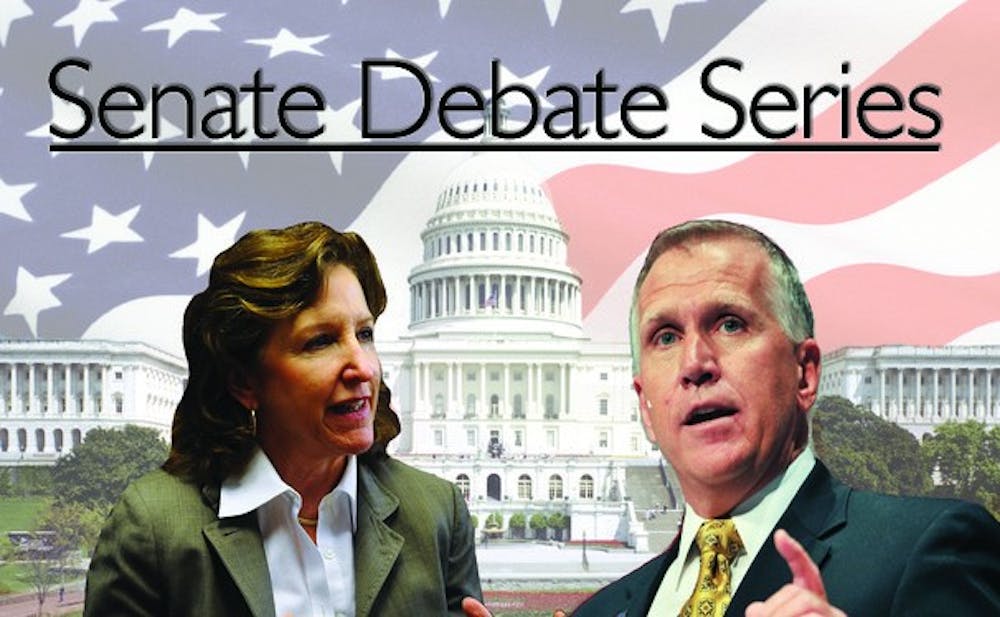Democratic Senator Kay Hagan and Republican challenger Thom Tillis butted heads over legislative records on the first of three U.S. Senate debates Wednesday.
Tillis and Hagan are closely tied in a contentious race slated as one of a critical few on which the Democrat-controlled Senate depends to keep its majority. The Republicans must win six seats in order to tip the balance of power in their favor. A USA TODAY and Suffolk University poll earlier this month showed Hagan two points in the lead, while a poll by the conservative Civitas Institute showed Tillis ahead by one point. Key issues addressed in the debate included education, healthcare, access to contraceptives, immigration and minimum wage.
Rundown of central debate issues
Hagan criticized Tillis’ record of supporting budget cuts to education funds. Tillis pointed to the N.C. legislature’s recent bill that raises teachers’ salaries by 7 percent, which Hagan countered by noting that senior teachers would only see a 0.3 percent pay raise.
North Carolina has seen an “exodus” of teachers under Tillis’ leadership of the legislature, Hagan said.
The Affordable Care Act—a centerpiece of the Tillis campaign’s attack ads over the past few months—remained a topic of contention in the debate. Tillis criticized Hagan of breaking her promise that North Carolina residents would be able to keep their healthcare plans, and Hagan accused Tillis of refusing to expand Medicaid for 500,000 residents.
Hagan also said she is trying to fix issues within the ACA and attributed the healthcare policy cancellations in part to dishonesty by insurance companies.
When asked about the Hobby Lobby decision that corporations cannot be required to provide contraception in their health care plans, Tillis said he supported contraception but added that private businesses had the right of religious freedom not to provide them to employees.
“I actually agree with the American Medical Association that we should make contraception more widely available,” Tillis said.
Hagan said Tillis had “consistently made it difficult” for women to access birth control and accused him of being out of touch with female voters.
When pressed to answer whether he thought a $7.25 per hour minimum wage was enough for North Carolina, Tillis responded by saying that with Hagan’s policies, costs would increase to the point that no minimum wage would be sufficient for workers to live on.
“What leader would settle for an economy based on minimum wage?” he said.
Both Hagan and Tillis agreed that action needed to be taken against the Islamic State of Iraq and Syria, which released a video yesterday of beheading an American journalist, Steven Sotloff, the second such incident to happen in a month.
“I want to see the president’s plans, and I’m ready to take action,” Hagan said, noting that Obama should have armed moderate Syrian rebels earlier.
On immigration, both candidates agreed that Obama should not act without Congress on allowing illegal immigrants to remain in the country. Hagan voiced support for the 2013 Gang of Eight Immigration Bill, adding that it was “not amnesty.”
Tillis denounced Obama’s unilateral approach to immigration, saying that the president had turned the three branches of government into “the executive branch, his pen and his phone.”
Hagan slammed Tillis’ voting record in the state legislature—equally unpopular with a disapproval rating of 54 percent. Tillis denounced Hagan for voting closely with President Obama—whose approval rating in North Carolina currently hovers at 41 percent.
Tillis accused Hagan repeatedly of being a rubber stamp for the president and accused her of not fulfilling the promises she would made in the 2008 election, calling her “Kay 1.0, Kay 2.0.”
Hagan responded by pointing to Tillis’ support of tax breaks and budget cuts in education during his tenure as Speaker of the N.C. House since 2011.
Stakes of the debate
Hagan campaign spokesman Chris Hayden dismissed the possibility that the president’s unpopularity would affect the race—but added that Hagan had fought him on several occasions.
“The president isn’t on the ballot,” Hayden said.
But Raffi Williams, deputy press secretary for the Republican National Committee, noted that national issues tend to come more into play in Senate races.
The race ranks among the most costly in the nation, reporting more outside spending than any other U.S. Senate race currently in progress. Last month, the Charlotte Observer reported that outside advocacy groups had poured in approximately $26 million into television ads for the race, and more recently, the Center for Responsive Politics reported that both campaigns combined have spent around $29 million.
The debates have the potential to push both candidates forward in the race, said David Rohde, Ernestine Friedl professor of political science.
“The normal situation would be that the challenger has a bigger stake in debates, because the challenger would be less well known and of a lesser stature than the incumbent,” Rohde said. “That’s probably true here.”
On the other hand, the debate also gives Senator Hagan the change to defend herself against the attacks, he added.
The debate was moderated by CBS News morning show anchor Norah O'Donnell. The second debate is set for Oct. 7, with ABC’s George Stephanopoulos as moderator.
Get The Chronicle straight to your inbox
Signup for our weekly newsletter. Cancel at any time.

